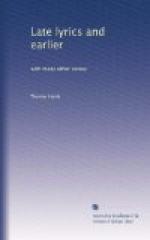APOLOGY
About half the verses that follow were written quite lately. The rest are older, having been held over in Ms. when past volumes were published, on considering that these would contain a sufficient number of pages to offer readers at one time, more especially during the distractions of the war. The unusually far back poems to be found here are, however, but some that were overlooked in gathering previous collections. A freshness in them, now unattainable, seemed to make up for their inexperience and to justify their inclusion. A few are dated; the dates of others are not discoverable.
The launching of a volume of this kind in neo-Georgian days by one who began writing in mid-Victorian, and has published nothing to speak of for some years, may seem to call for a few words of excuse or explanation. Whether or no, readers may feel assured that a new book is submitted to them with great hesitation at so belated a date. Insistent practical reasons, however, among which were requests from some illustrious men of letters who are in sympathy with my productions, the accident that several of the poems have already seen the light, and that dozens of them have been lying about for years, compelled the course adopted, in spite of the natural disinclination of a writer whose works have been so frequently regarded askance by a pragmatic section here and there, to draw attention to them once more.
I do not know that it is necessary to say much on the contents of the book, even in deference to suggestions that will be mentioned presently. I believe that those readers who care for my poems at all—readers to whom no passport is required—will care for this new instalment of them, perhaps the last, as much as for any that have preceded them. Moreover, in the eyes of a less friendly class the pieces, though a very mixed collection indeed, contain, so far as I am able to see, little or nothing in technic or teaching that can be considered a Star-Chamber matter, or so much as agitating to a ladies’ school; even though, to use Wordsworth’s observation in his Preface to Lyrical Ballads, such readers may suppose “that by the act of writing in verse an author makes a formal engagement that he will gratify certain known habits of association: that he not only thus apprises the reader that certain classes of ideas and expressions will be found in his book, but that others will be carefully excluded.”
It is true, nevertheless, that some grave, positive, stark, delineations are interspersed among those of the passive, lighter, and traditional sort presumably nearer to stereotyped tastes. For— while I am quite aware that a thinker is not expected, and, indeed, is scarcely allowed, now more than heretofore, to state all that crosses his mind concerning existence in this universe, in his attempts to explain or excuse the presence of evil and the incongruity of penalizing




